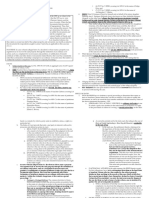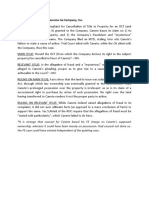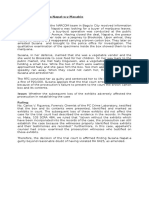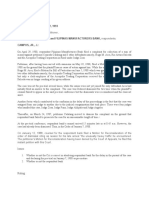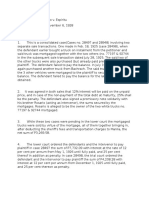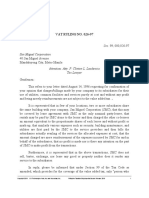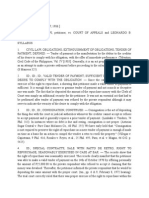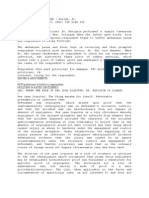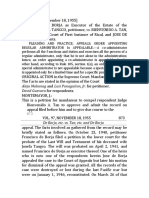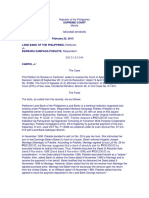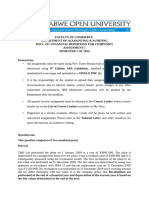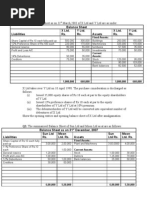CIR Vs Toshiba Information Equipment
CIR Vs Toshiba Information Equipment
Uploaded by
ShaneBeriñaImperialCopyright:
Available Formats
CIR Vs Toshiba Information Equipment
CIR Vs Toshiba Information Equipment
Uploaded by
ShaneBeriñaImperialOriginal Description:
Original Title
Copyright
Available Formats
Share this document
Did you find this document useful?
Is this content inappropriate?
Copyright:
Available Formats
CIR Vs Toshiba Information Equipment
CIR Vs Toshiba Information Equipment
Uploaded by
ShaneBeriñaImperialCopyright:
Available Formats
CIR vs Toshiba Information Equipment (Phil.) G.R. No.
150154, 9 August 2005
Facts:
Toshiba was claiming a refund for the input tax it paid on unutilized capital goods
purchased. However, the CIR said that it cannot because the capital goods and
services it purchased are considered not used in VAT taxable business and
therefore, it is not entitled to refund of input taxes. Toshiba, on the other hand,
contended that it is PEZA-registered and located within the ecozone and therefore
for, VAT-exempt entity.
Issue:
Whether or not Toshiba is entitled to refund for the input tax it paid on unutilized
capital goods purchased considering that it is registered with PEZA and located
within the ecozone.
Ruling:
Yes. CIR failed to differentiate between VAT-exempt transactions from VAT-exempt
entities. An exempt transactions are transactions specifically listed in and expressly
exempted from VAT under the Tax Code without regard to the tax status, VAT-
exempt or not, of the taxpayer. An exempt party, on the other hand, is a person or
entity granted VAT-exemption under the Tax Code, special law or an international
agreement to which the Philippines is a signatory and by virtue of which its taxable
transactions become exempt from VAT.
Toshiba, a PEZA-registered and located within a ecozone is a VAT-exempt entity
because of Sec 8 of Ta 7916 which establishes the fiction that ecozones are foreign
territory. Therefore, a supplier from the custom territory cannot pass on output VAT
to an ecozone enterprise, like Toshiba, since it is exempt.
\
CIR vs Seagate Technology (Philippines) G.R. No. 153866, 11 February 2005
Facts:
Seagate Technology was claiming a refund for the input tax it paid on the unutilized
capital goods purchased. It asserted that it is exempt from all internal revenue taxes
including VAT since it is registered in and operating from the Special Economic Zone
in Naga, Cebu.
Issue:
Whether or not an entity registered and operating within an ecozone is exempt from
all revenue taxes including VAT.
Ruling:
Yes. Ecozone is considered by law as a separate customs authority. It means that in
such zone is created the legal fiction of foreign authority although it is a
geographical territory of the Philippines.
Under the cross-border principle of the VAT system, no VAT shall be imposed to form
part of the cost of the goods destined for consumption outside of the territorial
border of the taxing authority. If exports of goods and services from the Philippines
to a foreign authority are free of VAT, then the same rule holds for such exports
from the national territory to an ecozone.
This is to encourage foreign investments in order to win international markets and
to promote sustainable economic growth.
You might also like
- Reyes v. EnriquezDocument2 pagesReyes v. EnriquezIan VillafuerteNo ratings yet
- Municipal Trial Courts in Cities: Master List of Incumbent JudgesDocument8 pagesMunicipal Trial Courts in Cities: Master List of Incumbent JudgesShaneBeriñaImperial100% (1)
- Consti Law Case DigestsDocument10 pagesConsti Law Case DigestsShaneBeriñaImperialNo ratings yet
- Multiple Choice QuestionsDocument33 pagesMultiple Choice QuestionsDennis DimaanoNo ratings yet
- CS183B How To Start A StartupDocument254 pagesCS183B How To Start A StartupTony StarkNo ratings yet
- Kepco v. CIRDocument4 pagesKepco v. CIRWhere Did Macky GallegoNo ratings yet
- Matthews vs. TaylorDocument3 pagesMatthews vs. Taylorrheyz pierceNo ratings yet
- BIR Ruling 98-97Document1 pageBIR Ruling 98-97Kenneth BuriNo ratings yet
- Master Copy Utopia LMT 2022 - Ut 0121 - LaborDocument11 pagesMaster Copy Utopia LMT 2022 - Ut 0121 - LaborChristian TajarrosNo ratings yet
- Gan V CA DIgestDocument1 pageGan V CA DIgestMarc Edmer MercadoNo ratings yet
- Cañete Et Al. vs. Genuino Ice Company, IncDocument1 pageCañete Et Al. vs. Genuino Ice Company, IncRean Raphaelle GonzalesNo ratings yet
- Pastor Vs CADocument8 pagesPastor Vs CABreth1979No ratings yet
- People V PinedaDocument3 pagesPeople V PinedajennyMBNo ratings yet
- Cason vs. San PedroDocument5 pagesCason vs. San PedroKrisseyNo ratings yet
- Home Insurance Co. v. Eastern Shipping LinesDocument6 pagesHome Insurance Co. v. Eastern Shipping LinesSecret BookNo ratings yet
- In The Matter of The Intestate Estate of Deceased Ismael ReyesDocument2 pagesIn The Matter of The Intestate Estate of Deceased Ismael ReyesLab LeeNo ratings yet
- Intosai Gov 9130 eDocument39 pagesIntosai Gov 9130 enmsusarla999No ratings yet
- Fort Bonifacio Development Corporation vs. Commissioner of Internal RevenueDocument28 pagesFort Bonifacio Development Corporation vs. Commissioner of Internal RevenueAriel AbisNo ratings yet
- 7 - People vs. Napat-ADocument1 page7 - People vs. Napat-AKarla KatNo ratings yet
- Piandiong V The PhilippinesDocument2 pagesPiandiong V The PhilippinesAnonymous 5fqIQI3No ratings yet
- Calalang Vs CADocument2 pagesCalalang Vs CAAnn Alejo-Dela TorreNo ratings yet
- The Bachrach Motor Co VDocument5 pagesThe Bachrach Motor Co VVampire CatNo ratings yet
- Fortune Life Insurance Company vs. CoaDocument2 pagesFortune Life Insurance Company vs. CoaGil Ray Vergara OntalNo ratings yet
- Batch 5 Case 5&6Document3 pagesBatch 5 Case 5&6Maryjoy MelchorNo ratings yet
- No 14 - The Late Lino Gutierrez V Collector of Internal RevenueDocument2 pagesNo 14 - The Late Lino Gutierrez V Collector of Internal RevenueA Paula Cruz FranciscoNo ratings yet
- VAT Ruling 26-97 PDFDocument2 pagesVAT Ruling 26-97 PDFArren RelucioNo ratings yet
- CANON 11 Script ReportDocument10 pagesCANON 11 Script Reportkaren mariz manaNo ratings yet
- Cariaga Vs Laguna Tayabas Bus CompanyDocument2 pagesCariaga Vs Laguna Tayabas Bus CompanyTenet ManzanoNo ratings yet
- People V Bustamante Crim QualifiedDocument1 pagePeople V Bustamante Crim QualifiedRomarie AbrazaldoNo ratings yet
- Commissioner Vs Magsaysay LinesDocument2 pagesCommissioner Vs Magsaysay LinesVerlynMayThereseCaroNo ratings yet
- C. Assessment Process Case Digests CompilationDocument16 pagesC. Assessment Process Case Digests CompilationWAYNENo ratings yet
- Regino v. Pangasinan Colleges of Science and TechnologyDocument2 pagesRegino v. Pangasinan Colleges of Science and TechnologyJG UdNo ratings yet
- Taxation Law IIDocument16 pagesTaxation Law IIJoedhel ApostolNo ratings yet
- BPI vs. Intermediate Appellate Court GR# L-66826, August 19, 1988Document3 pagesBPI vs. Intermediate Appellate Court GR# L-66826, August 19, 1988Jolet Paulo Dela CruzNo ratings yet
- Fishwealth Canning Corp Vs Cir (GR 179343 January 21 2010)Document2 pagesFishwealth Canning Corp Vs Cir (GR 179343 January 21 2010)Brian BaldwinNo ratings yet
- Cir Vs San Roque 690 Scra 336Document5 pagesCir Vs San Roque 690 Scra 336Izzy Martin MaxinoNo ratings yet
- Parish Priest of Roman Catholic Church of Victoria, Tarlac vs. Rigor (89 SCRA 493 G.R. No. L-22036 Dated April 30, 1979)Document7 pagesParish Priest of Roman Catholic Church of Victoria, Tarlac vs. Rigor (89 SCRA 493 G.R. No. L-22036 Dated April 30, 1979)Gia DimayugaNo ratings yet
- Avon Insurance Et Al. vs. CA RTC of Manila and Yupangco Cotton MillsDocument2 pagesAvon Insurance Et Al. vs. CA RTC of Manila and Yupangco Cotton MillsEANo ratings yet
- Vidal de Roces V PosadasDocument1 pageVidal de Roces V PosadasKat Dela PazNo ratings yet
- Rizal Labor Union Vs Rizal Cement Co. IncDocument2 pagesRizal Labor Union Vs Rizal Cement Co. IncMabelle ArellanoNo ratings yet
- Eternal Gardens Memorial Park Corporation vs. Philippine American Life InsuranceDocument1 pageEternal Gardens Memorial Park Corporation vs. Philippine American Life InsuranceRoxanne AvilaNo ratings yet
- Tax Case Digests For 27 JanDocument7 pagesTax Case Digests For 27 JanJermaeDelosSantosNo ratings yet
- La Flor Dela Isabela v. CIRDocument8 pagesLa Flor Dela Isabela v. CIRCarla DomingoNo ratings yet
- Duran Vs IACDocument2 pagesDuran Vs IACApple ObiasNo ratings yet
- Legaspi V CADocument7 pagesLegaspi V CAElizabeth LotillaNo ratings yet
- 03 Heirs of Borlado vs. CADocument1 page03 Heirs of Borlado vs. CAMichael RentozaNo ratings yet
- Batiquin vs. CaDocument2 pagesBatiquin vs. CaHelen Grace M. BautistaNo ratings yet
- Northern Mindanao Power Corporation Vs CIRDocument3 pagesNorthern Mindanao Power Corporation Vs CIRAnneNo ratings yet
- De Borja Etc. vs. Tan Etc. and de BorjaDocument4 pagesDe Borja Etc. vs. Tan Etc. and de BorjaAngela AngelesNo ratings yet
- Gutierrez Vs Capital InsuranceDocument1 pageGutierrez Vs Capital InsuranceAllen Michael B. EscuderoNo ratings yet
- Cotia V JimenezDocument1 pageCotia V JimeneztrishortizNo ratings yet
- 2 Matute v. Court of AppealsDocument31 pages2 Matute v. Court of AppealsMary Licel RegalaNo ratings yet
- Rule 83 - 87 Case Digests (Special Proceedings)Document14 pagesRule 83 - 87 Case Digests (Special Proceedings)RobNo ratings yet
- Meralco Securities Industrial Corp V CBAADocument1 pageMeralco Securities Industrial Corp V CBAAJohn YeungNo ratings yet
- Reason:: Sec. 229 in Any Case, No Such Suit or Proceeding Shall Be Filed After TheDocument3 pagesReason:: Sec. 229 in Any Case, No Such Suit or Proceeding Shall Be Filed After TheDrew RodriguezNo ratings yet
- Tuason V CADocument2 pagesTuason V CAKylie Kaur Manalon DadoNo ratings yet
- Tajonera Vs CADocument2 pagesTajonera Vs CAMarilou GaralNo ratings yet
- Banzon vs. Cruz, 45 SCRA 475Document6 pagesBanzon vs. Cruz, 45 SCRA 475MJ BautistaNo ratings yet
- 10.10 People vs. Sandiganbayan (Fourth Division)Document14 pages10.10 People vs. Sandiganbayan (Fourth Division)Jm SantosNo ratings yet
- LBP Vs PobleteDocument7 pagesLBP Vs Pobletep95No ratings yet
- Kepco Ilijan CORPORATION, Petitioner, v. Commissioner of Internal REVENUE, RespondentDocument12 pagesKepco Ilijan CORPORATION, Petitioner, v. Commissioner of Internal REVENUE, RespondentnomercykillingNo ratings yet
- Heirs of Sotto V. Palicte, G.R. NO. 159691, FEBRUARY 17, 2014Document6 pagesHeirs of Sotto V. Palicte, G.R. NO. 159691, FEBRUARY 17, 2014Satfat TotalfatNo ratings yet
- CIR Vs Toshiba Information EquipmentDocument1 pageCIR Vs Toshiba Information EquipmentKayee KatNo ratings yet
- CIR Vs Seagate Technology (Philippines) G.R. No. 153866, 11 February 2005Document2 pagesCIR Vs Seagate Technology (Philippines) G.R. No. 153866, 11 February 2005luckyNo ratings yet
- Important Dates To Remember - IBP ElectionsDocument1 pageImportant Dates To Remember - IBP ElectionsShaneBeriñaImperialNo ratings yet
- Bill of Rights OutlineDocument13 pagesBill of Rights OutlineShaneBeriñaImperialNo ratings yet
- 001-HSBC Employees Union, Et Al. v. NLRC3, Et Al. G.R. No. 156635 January 11, 2016Document16 pages001-HSBC Employees Union, Et Al. v. NLRC3, Et Al. G.R. No. 156635 January 11, 2016ShaneBeriñaImperialNo ratings yet
- Outline 1 StatConDocument6 pagesOutline 1 StatConShaneBeriñaImperialNo ratings yet
- 3-Intestate Estate of Gonzales v. People G.R. No. 181409 February 11, 2010Document12 pages3-Intestate Estate of Gonzales v. People G.R. No. 181409 February 11, 2010ShaneBeriñaImperialNo ratings yet
- 7-Mendoza v. People G.R. No. 183891 October 19, 2011Document4 pages7-Mendoza v. People G.R. No. 183891 October 19, 2011ShaneBeriñaImperialNo ratings yet
- Silicon Philippines, Inc. (Formerly Intel Philippines Manufacturing, Inc.), PetitionerDocument12 pagesSilicon Philippines, Inc. (Formerly Intel Philippines Manufacturing, Inc.), PetitionerShaneBeriñaImperialNo ratings yet
- Project MBADocument9 pagesProject MBAharnandanNo ratings yet
- Assignment Book of New Enterprise and Innovation Management: Admin (Type The Document Subtitle)Document5 pagesAssignment Book of New Enterprise and Innovation Management: Admin (Type The Document Subtitle)nikskagalwalaNo ratings yet
- Mrunal Sir Latest 2020 Handout 4 PDFDocument21 pagesMrunal Sir Latest 2020 Handout 4 PDFdaljit singhNo ratings yet
- Accounting For Islamic BanksDocument31 pagesAccounting For Islamic BanksShaikhaAlnoaimiNo ratings yet
- Chairman S Report Chairman S ReportDocument10 pagesChairman S Report Chairman S ReportRio Aiko IndiolaNo ratings yet
- DISCUSSIONDocument1 pageDISCUSSIONMhaliNo ratings yet
- The Realtionship Between Earnings Yield, Market Value and Return For Nyse Common Stocks - BasuDocument28 pagesThe Realtionship Between Earnings Yield, Market Value and Return For Nyse Common Stocks - BasuflaszaNo ratings yet
- Mergers Group Assignment - Group 2Document29 pagesMergers Group Assignment - Group 2arsy syahNo ratings yet
- Bacc 237 Assignment OneDocument4 pagesBacc 237 Assignment OneTarusengaNo ratings yet
- Internship ReportDocument6 pagesInternship ReportMasudur RahmanNo ratings yet
- ISE Internship Report-AIOUDocument102 pagesISE Internship Report-AIOUKomal ShujaatNo ratings yet
- Godrej Branding StrategyDocument19 pagesGodrej Branding StrategysiddheshsonawaneNo ratings yet
- Vasdan & Co Inv BrochureDocument14 pagesVasdan & Co Inv Brochurejeng26abrogenaNo ratings yet
- Chapter 15Document59 pagesChapter 15moath100% (1)
- Ch-5 Policies in Functional AreasDocument4 pagesCh-5 Policies in Functional AreasTanya MadraNo ratings yet
- ASBJ Statement No. 11 and ASBJ Guidance No. 13 Kouji-Keiyaku - As-4Document5 pagesASBJ Statement No. 11 and ASBJ Guidance No. 13 Kouji-Keiyaku - As-4damayantiekNo ratings yet
- Measure of Eco WelfareDocument7 pagesMeasure of Eco WelfareRUDRESH SINGHNo ratings yet
- Manual Ceteris ParibusDocument12 pagesManual Ceteris ParibusAbhitej KodaliNo ratings yet
- Report of The Rbi-Sebi Standing Technical Committee ON Exchange Traded Currency FuturesDocument21 pagesReport of The Rbi-Sebi Standing Technical Committee ON Exchange Traded Currency FuturesAnnie NishankNo ratings yet
- 2 CFAS Course Assessment A To DDocument4 pages2 CFAS Course Assessment A To DKing SigueNo ratings yet
- Illustrations AmalgamationDocument4 pagesIllustrations Amalgamationajay2741100% (1)
- ME 291 Engineering Economy: Combining FactorsDocument15 pagesME 291 Engineering Economy: Combining FactorsEhsan Ur RehmanNo ratings yet
- Citi BankDocument3 pagesCiti Bankmuffadal0307No ratings yet
- Finals Conceptual Framework and Accounting Standards AnswerkeyDocument7 pagesFinals Conceptual Framework and Accounting Standards AnswerkeyMay Anne MenesesNo ratings yet
- Marginal CostingDocument30 pagesMarginal Costinganon_3722476140% (1)
- Shareholders Right in GMDocument13 pagesShareholders Right in GMWan M Luqman FauziNo ratings yet
- Hydro China Dawood Wind FarmDocument3 pagesHydro China Dawood Wind FarmSPIKELET CRAFTSNo ratings yet
- Pfrs 11Document2 pagesPfrs 11Gezalyn GuevarraNo ratings yet
